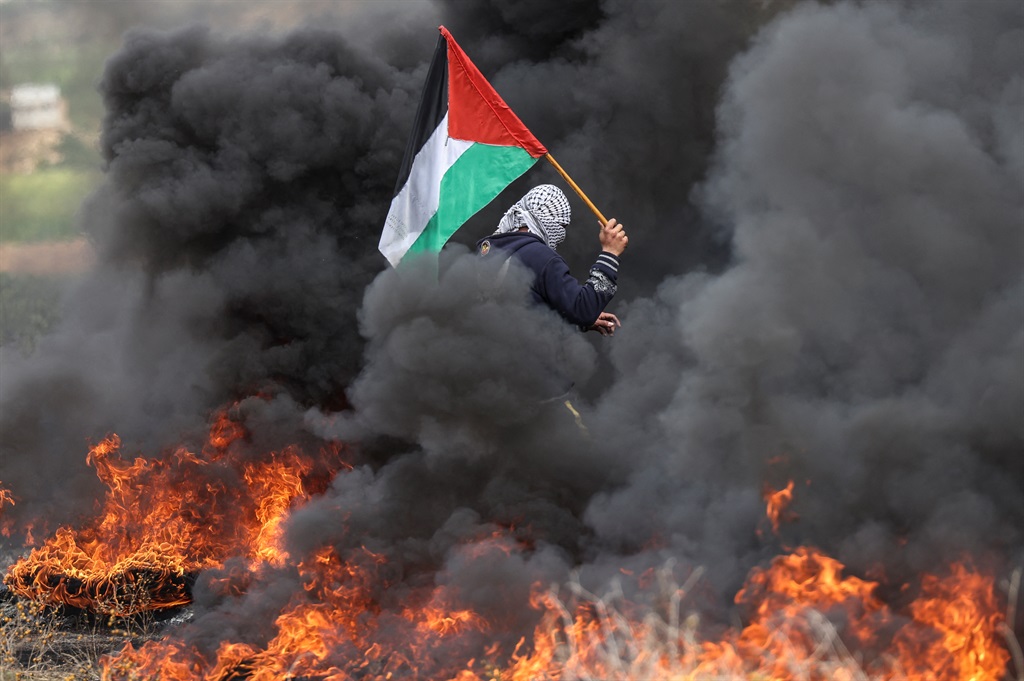
One of the first major instances of the Nakba narrative being accepted on the international stage happened in 2007 when UN Secretary-General Ban Ki-moon conveyed his empathy to PA president Mahmoud Abbas," writes Chaim Lax. He examines significance of term and how it gained popularity.
"The Nakba" is repeatedly invoked in media, academic literature, politics, and popular culture surrounding the Israeli-Palestinian conflict. Its appearance is so ubiquitous at this point that it seems like it has always been part of the general lexicon.
However, this is not the case.
Here, we'll look at the significance of the term "Nakba," the history of the term from 1948 until the present, how this Arabic term gained popularity around the world, and the adoption of the term by some to refer to anti-Jewish persecution by the Arab and Muslim worlds.
The Nakba: Israel’s Founding as a Catastrophe
In Arabic, the term "al-Nakba" means "the catastrophe." In the context of the Israeli-Palestinian conflict, the catastrophe that the "Nakba" is referring to is the founding of the State of Israel in 1948 and the disintegration of Palestinian Arab society.
ANOTHER VIEW | OPINION: Saleh Hijazi: Nakba – Israel’s erasure of Palestinians and their narrative
For those who adopt this narrative, the Zionist movement and Israel are solely responsible for the displacement of Palestinian Arabs between 1947 and 1949, while Arabs are the victims of the conflict.
By failing to take into account the Palestinian and Arab refusal to accept a two-state solution in 1947 and the subsequent military attempt to destroy the Jewish state, the Nakba narrative advances the claim of perpetual Palestinian victimhood and serves as a historical basis for the Palestinian right of return.
From 1948 to 1998
The term "al-Nakba” first entered the political lexicon of the Arab world in the late 1930s as a reference to the dissolution of the Ottoman Empire and the creation of the modern Middle East in 1920.
The term first became associated with the Israeli-Palestinian conflict in August 1948 (as the Israeli War of Independence still raged on) when Constantine Zurayk, a Syrian academic and diplomat based in Beirut, published a slim volume entitled Maana al-Nakba (The Meaning of the Catastrophe).
In this work, Zurayk blamed Arab leaders for the Nakba (due to their military failures and urging of Arab civilians to flee until after the fighting) rather than an alleged grand premeditated Zionist plan to displace the local Arab population (which later became a standard component of the Nakba narrative).
As well, Zurayk's Pan-Arab ideology meant that he did not consider the Nakba to be an exclusive Palestinian catastrophe but one that primarily affected the larger Arab world.
READ | Gaza ceasefire takes effect after five days of deadly fighting
In the 1950s, some Palestinian writers such as Aref al-Aref, began using the term "Nakba" in their writings, while others preferred to use different terms. In a 1956 work, Haj Amin al-Husseini, the former Grand Mufti of Jerusalem, used the term "al-Karitha" (meaning catastrophe/disaster) since "al-Nakba" had a connotation of the fate of Palestinian Arab society in 1948 being self-inflicted.
In the decades following Constantine Zurayk's introduction of "al-Nakba" to the Palestinian political lexicon, the term evolved to refer to a narrative that focused exclusively on the Palestinian Arabs (instead of the greater Arab nation) and gradually began to ascribe all blame for the dissolution of Palestinian Arab society to Israeli actions.
In the 1980s, the Nakba narrative gained a significant boon with the appearance of the "new historians," a group of up-and-coming Israeli scholars who challenged the traditional Zionist account of the events of 1948 and adopted the portrayal of the Israelis as aggressors and the Palestinian Arabs as victims.
However, in 2008, Benny Morris, considered to be the "dean" of the "new historians," decried the fact that his work was being used to prop up the Nakba narrative. In a letter to the Irish Times, Morris claimed that the events of 1948 were much more nuanced and complex than the simplistic interpretation put forward by this narrative.
Post-1998: From the Sidelines to Center Stage
In 1998, as Israel was celebrating its 50th independence day, Palestinian leader Yasser Arafat declared 15 May (the day after Israel's independence) to be "Nakba Day."
As part of his announcement, Arafat declared that the ultimate goal was the return of millions of Palestinian refugees and their descendants to Israel and the establishment of an "independent Palestinian state on our land."
Since then, some Nakba Days have passed peacefully while others have been violent and deadly. Whether a Nakba Day is relatively peaceful or violent usually depends on the political atmosphere prevailing at the time. For instance, the Nakba Days of 1999 and 2000 were relatively peaceful but the Nakba Day of 2001, the first to take place during the Second Intifada, was marked by the deaths of four Palestinians and one Israeli.
Since the establishment of Nakba Day in 1998, the Nakba narrative has gained greater prominence in both the Israeli and Palestinian discourses as well as on the international stage.
READ | Benjamin Pogrund: Israeli-Palestinian conflict: A crisis of leadership
In 2001, the Arab youth organisation Baladna was founded in Israel. It promotes a worldview steeped in this narrative and promotes the Palestinian right of return.
In 2007, Israeli Minister of Education, Yuli Tamir of the Labour Party, allowed for a textbook that featured aspects of the Nakba narrative to be included in the curriculum for Arab-Israeli elementary students. This led to a vociferous debate within the Knesset.
One of the first major instances of the Nakba narrative being accepted on the international stage occurred in 2007 when UN Secretary-General Ban Ki-moon conveyed his empathy to PA president Mahmoud Abbas on the occasion of "Nakba Day."
Since 1998, the acceptance of this narrative has also spread within Western academic institutions as well as the global media. This trend is easily observable through a search of both library catalogues and newspaper archives. A quick search of The New York Times archives shows that between 1948 and 1997, the term "Nakba" only appeared once in an article. Since 1998, it has appeared over 200 times in a wide variety of pieces.
The Jewish Nakba: A disregarded catastrophe
In recent years, both Israeli and global Jewish leaders have begun to commemorate what is termed the "Jewish Nakba."
The "Jewish Nakba" refers to the persecution and displacement of 850,000 Jews from their homes in the Middle East and North Africa. It also memorialises the Jewish areas in the Land of Israel that were depopulated by Arab forces in 1948.
The term "Jewish Nakba" is meant to rectify the historical record by disproving the narrative that Palestinian Arabs were the sole victims of the events of 1948 as well as to convey the complexity of the situation that arose with Israel's independence (as opposed to the simplicity of the Nakba narrative).
However, some oppose the use of the term "Jewish Nakba" as it legitimises the use of the term "Nakba" and also seems to equate the persecution of Jews living in far-flung Arab and Muslim lands with the consequences of Arab rejectionism and the subsequent invasion of the nascent Jewish state.
- Chaim Lax is an Canadian-Israeli writer and editor of HonestReporting.
*Want to respond to the columnist? Send your letter or article to opinions@news24.com with your name and town or province. You are welcome to also send a profile picture. We encourage a diversity of voices and views in our readers' submissions and reserve the right not to publish any and all submissions received.
Disclaimer: News24 encourages freedom of speech and the expression of diverse views. The views of columnists published on News24 are therefore their own and do not necessarily represent the views of News24.




 Publications
Publications
 Partners
Partners























